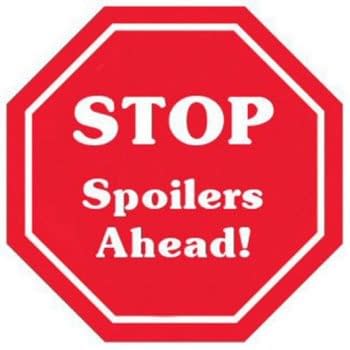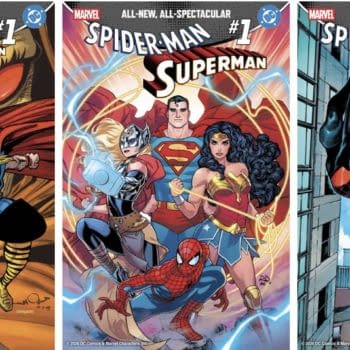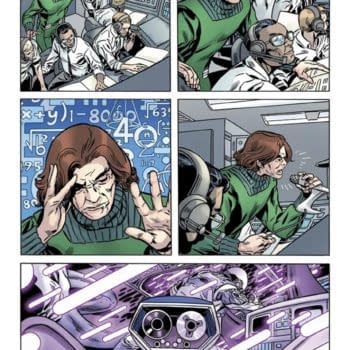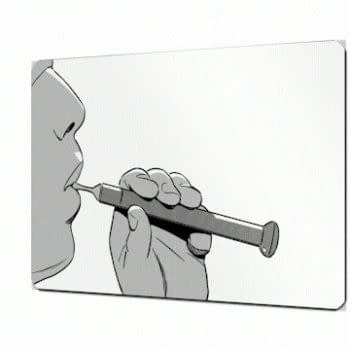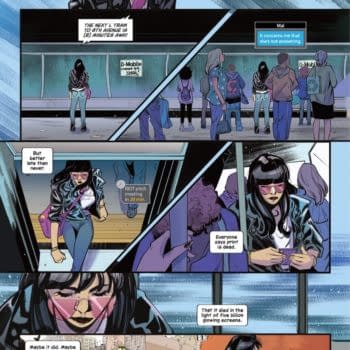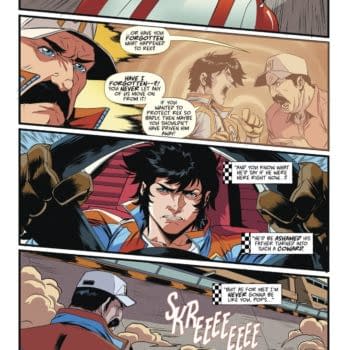Posted in: Comics | Tagged: code, Comics, entertainment, michael davis, michaeldavis, milestone
Code Black 3: Strike Zone – Michael Davis, From The Edge
 Michael Davis is the co-founder of Milestone Comics and a current graphic novelist. He runs The Black Panel at San Diego Comic Con. And he now writes a weekly column for Bleeding Cool. This is part three of a three part series
Michael Davis is the co-founder of Milestone Comics and a current graphic novelist. He runs The Black Panel at San Diego Comic Con. And he now writes a weekly column for Bleeding Cool. This is part three of a three part series
To many fans of the great American pastime, there was nothing more offensive than a Negro ballplayer. When Jackie Robinson broke the color barrier in 1947, there were organized revolts within the country as well as within baseball. By 1954, Jackie had pretty much won over baseball fans and a great many Americans. In spite of the fact that victory was being waged and won on the baseball field, African Americans were still fighting on many other fronts.
Some of those battles were public, a great many more were private, and some were utterly secret.
Utter secrecy may even be an understatement. It's safe to say that in 1954, people concerned about civil rights, be they Black or white, were not giving any thought to comic books as a tool for social change.
Except there were a few people in comics who were fighting the very fight that Branch Rickey had fought for Jackie Robinson. At the forefront of that battle in 1956 were the Comics Code Authority (only two years old at the time) and EC Comics.
The Code tried it's best to stop EC from publishing a particularly offensive (to them) comic book. The book they were trying to stop was an issue of Incredible Science Fiction, and the story was called "Judgment Day."
The single moment to which they objected was not a gory scene of a space monster, under orders from a criminal, ripping to pieces an earth girl who, clad in scant bra and panties, was an obvious sexual tease for young 50s era boys.
The main character, an astronaut, was revealed on the last page in the last panel to be a Black man, and that could not stand.
The CCA wanted the story removed or the last panel changed. EC's editor William Gaines responded to that demand with two words: "Fuck you."
And there, for all who have waited for my foul mouth to return, it is. Although I don't think that counts — it's a quote, and as such I can't take credit (or blame) for its use.
But (sorry Peter) I digress.
William Gaines and Branch Rickey were great men.
Their accomplishments in baseball and comics alone made them that way. Those achievements aside, they were also civil rights pioneers, two white men fighting battles for and against their beloved industries. The odds were the least of the things stacked against them.
What's rarely mentioned is that each man had quite a bit to lose if their voices, ringing loud for race equality, were drowned out by even louder voices. The tide and timing of a movement is so fickle and random, it's easy to imagine Jackie not getting a shot on the Dodgers if one of his ducks did not line up.
For a long moment, most thought China would see democracy. We all remember the lone man standing his ground against a tank for the entire world to see. How could China deny its people freedom from government oppression when the entire world was watching?
How? It turns out they had more than one tank.
Those who practice racial injustice categorize history as a justification, and then sell that justification as a right.
That shot fired in 1956 started a war in the comic book industry over Black storylines, Black characters, and Black creators that continues today.
It's not a war the mainstream public nor most comic book readers would call a war, but nevertheless, to some who experience racial feedback, it's nothing short of one.
Racism in comics is not always an attempt to deny someone based on prejudice. It could be the result of just plain stupidity. I don't really think there are many (if any) racists in comics. People who respond, in my defense, to some of my critics with the race card are (I think, I hope) pointing out a clear difference between what I'm able to get away with, and what someone like Donald Trump can get away with. Donald Trump talks much more smack than I do, and yes he is white, but he's also super rich.
It's easy to see why some would say "Trump can talk smack and get away with it, but Davis gets the hate because he's Black and should know his place."
Trump's accusations against the President looked to the majority of Black people to be racist. And it was. Saying Obama had to produce a birth certificate to prove he was born here was akin to asking a Black man to "show his papers" during the era of slavery. Yes, the act was certainly racist, but does that make Trump a racist?
I can't stand the man, but I don't think he's a racist. Stupid? He got pimp-slapped over that comment, and went from GOP frontrunner to GOP laughingstock in a matter of weeks, so is he stupid? You tell me.
A project of mine was loved, and then rejected by a "they-who-must-not-be-named" publisher. Why? Because there were too many Black superheroes in the book, and Black does not sell. Yes, that's what I was told…well, that was what my agent was told. I doubt if anyone would be stupid enough to tell that to any serious Black creator.
Then again…
In the now-21 years since Milestone came on the scene, the company is still regarded as the foremost African American comic book company.
I'm asked the following question all the time: "where is the next wave?" Well, the next wave is here, and has been here for a bit, but you have to know where to look.
Within the African American comics community, there exists splits that mainstream comic book readers for the most part are not aware of. Most Black creators regard Milestone with respect, but there are some young Black creators who see Milestone as a group of sellouts, Uncle Toms, or worst.
Some in the Black comic book community have gone so far as to brand Milestone the "House Niggers" when discussing Milestone's groundbreaking deal with DC Comics.
This is the state of the very real divide within the Black comics community.
There is a thriving independent group of young Black creators who are doing bold and wonderful work. They publish with small indie houses or they self-publish. The stories they are creating are mostly Afro-centric and mostly positive, but there are some that are anti#-establishment, AKA, anti-white.
On the flipside of that, there is a contingent of Black creators who reject all other forms of publishing unless a major publisher publishes them, and by major publisher I mean the two big boys, Marvel and DC.
Lastly, there are those Black creators who would not publish with Marvel or DC if their lives depended on it, seeing both companies as comic's answer to plantations.
With all the seemingly inexhaustible Black talent out there, why am I asked over and over again where the next wave is?
I have a theory, and it's not the same one I had when I wrote the first version of this piece.
In comics, Black anything (comic, creator, or character) at Marvel or DC is still seen as a breakthrough, 20 years after Milestone, and 58 years after Judgment Day.
Marvel's half-Black, half-Latino Spider-Man was a huge story, which captivated numerous news cycles. It was an original spin on the race card and I get that. Marvel made a point of playing up the biracial card, and hell, it was a biracial SPIDER-MAN — that's a big deal.
On the flipside of that, DC's New 52 Static was cancelled after only 6 issues. The outcry from many fans was that Static was cancelled because he was Black.
No. The book was cancelled because it wasn't very good.
Milestone was seen as unique because we did a line of books and we had a publishing deal with DC and they featured Black main characters.
It was a perfect storm.
The next wave is here, and like I said, it has been here for a while. Milestone was so huge, no one had to ask — we were easy to find.
When the race barrier was broken in baseball, after some time people started asking where the next Jackie Robinson was. That question was answered soon enough, and before long Blacks were so commonplace in the majors that the question became moot.
In comics, the question "where's the next wave?" is still valid.
Black comics commonplace? Lets not kid ourselves — but the next wave is here. You have to look a bit more carefully, but it's worth your time.
Try Watson & Holmes if you are looking for a jumping on point. Other suggestions will have to wait for some other time because now I've got to get busy reading all the posts that still speak to articles from four weeks ago.






